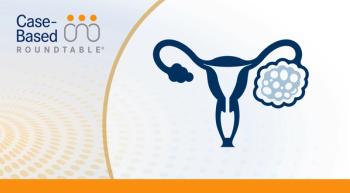
Targeted Therapies in Oncology
- October 2018
- Volume 7
- Issue 10
IO Combo Shows Potential in Persistent Ovarian Cancer
Combining the PD-1 checkpoint inhibitor nivolumab with the CTLA-4 checkpoint inhibitor ipilimumab led to superior survival rates compared to treatment with nivolumab alone in patients with persistent or recurrent ovarian cancer, according to findings from the phase II NRG-GY003 trial.
Combining the PD-1 checkpoint inhibitor nivolumab (Opdivo) with the CTLA-4 checkpoint inhibitor ipilimumab (Yervoy) led to superior survival rates compared to treatment with nivolumab alone in patients with persistent or recurrent ovarian cancer, according to findings from the phase II NRG-GY003 trial. Findings from the NRG Oncology trial demonstrated a trend in survival benefit with the combination regimen were released in a late-breaking abstract presentation during the 17th Biennial Meeting of the International Gynecological Cancer Society held in Kyoto, Japan.
The combination induced a 47.2% reduction in the risk of progression and a 21.1% reduction in the risk of death compared with nivolumab monotherapy.
“From my perspective, this is the first evidence that the addition of CTLA-4 targeted therapy to PD-1 targeted therapy in patients with ovarian cancer may be more beneficial than PD-1 targeted therapy alone,” said lead study author Robert A. Burger, MD, a professor of obstetrics and gynecology at the Perelman School of Medicine at the University of Pennsylvania, in a statement. “Future directions could include a trial combining nivolumab and ipilimumab in frontline therapy as an adjunct to standard chemotherapy.”
One hundred women with recurrent epithelial ovarian cancer were enrolled in the NRG-GY003 trial (NCT02498600) and randomized 1:1 to either the combination or nivolumab monotherapy arm. All patients could have received up to 3 prior treatments, including 1 prior platinum-based chemotherapy regimen. Additionally, patients had to have a platinum-free interval of up to 12 months.
The median age was 62 years, 82.0% of women had high-grade serous histology, and 63% had a platinum-free interval of less than 6 months.
Patients in the single-agent arm (n = 49) received 3 mg/kg of intravenous induction therapy with nivolumab every 2 weeks for 4 infusions followed by maintenance nivolumab every 2 weeks for up to 42 doses. In the combination arm (n = 51), patients were administered 3 mg/kg of nivolumab plus 1 mg/kg of ipilimumab every 3 weeks for 4 infusions followed by maintenance nivolumab at the same dosage.
The primary endpoint of the study was response rate at 6 months after randomization by RECIST criteria, and secondary endpoints included progression-free survival, overall survival, and adverse events.
The objective response rate was 31.4% in patients treated with nivolumab in combination with ipilimumab compared with 12.2% among those treated with nivolumab alone (odds ratio, 3.28;P= .034). The investigators also noted that 1 additional patient achieved a response in the combination arm after the 6-month randomization cutoff period.
The platinum-free interval stratified hazard ratio for progression-free survival was 0.528 (95% CI, 0.339-0.821) and the hazard ratio for overall survival was 0.789 (95% CI, 0.439-1.418).
Adverse events occurred more frequently in the combination arm versus the single-agent arm, with grade 3 or greater adverse events observed in 67% of patients in the combination arm compared with 55% in the monotherapy arm, for a total of adverse events observed in 61 patients.
The study authors noted in a statement that the toxicity profile with the combination was similar to that of previous reports for nivolumab and ipilimumab and there were no new safety signals. No treatment-related deaths were observed across the trial.
Reference:
Burger R, Sill M, Zamarin D, et al. NRG Oncology phase II randomized trial of nivolumab with or without ipilimumab in patients with persistent or recurrent ovarian cancer. Presented at: 17th Biennial Meeting of the International Gynecological Cancer Society; September 14-16, 2018; Kyoto, Japan. Abstract OC11.
The NRG-GY003 trial is closed to recruitment but is ongoing, with expected analyses of biomarkers for response with the combination regimen.
Articles in this issue
over 7 years ago
FDA Reorganization Meets Demands for Expedited Approvalsover 7 years ago
Patient Demand Drives Interest in Oncofertilityover 7 years ago
Induction Chemo Turns Cold Tumors Hot in Metastatic TNBC
















